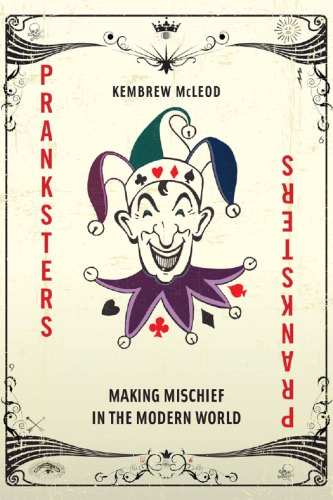
Pranksters
Making Mischief in the Modern World
- اطلاعات
- نقد و بررسی
- دیدگاه کاربران
نقد و بررسی

February 10, 2014
From Jonathan Swift’s “A Modest Proposal” to the modern “hacktivists” of anonymous “spoofing” corporations and governments, McLeod (Creative License), the man who actually trademarked the phrase “Freedom of Expression,” examines hoaxes, pranks, and successful feats of trickery that inspire widespread public amazement and reinforce the need to critically assess miraculous stories or occurrences. He shares thoughtful insights into both lighthearted hoaxes like the Feejee mermaid and well-known darker pranks, such as the 17th century Illuminati conspiracy created by a college student, or the 1980s “Satanic Panic.” Benjamin Franklin (who borrowed liberally from Swift) and P.T. Barnum are notable, famous tricksters, but McLeod’s description of the lonely, blind phone-phreakers who created their own “electronic social net-work” in the 1960s speaks to the primary need for expression and connection commonly found among the perpetrators. McLeod entertains and engages readers with everything from Thomas Paine to T-Pain in this clever mix of historical figures’ imaginative pranks and modern attempts to capture public attention.

February 15, 2014
The story of how mischief-makers hope to change the world one prank at a time. Self-proclaimed prankster McLeod (Communication Studies/Univ. of Iowa; Freedom of Expression: Resistance and Repression in the Age of Intellectual Property, 2007, etc.) defines pranks as "playful critiques performed within the public sphere and amplified by media." Pranksters, he asserts, "try to spark important debates and, in some instances, provoke social change." That was the author's aim when he trademarked the phrase "freedom of expression" and threatened to sue AT&T for using it without his permission. The media picked up the "serious joke," and McLeod was satisfied that the "fake lawsuit certainly got people talking" about the meaning of free speech. The author distinguishes pranks, intended to serve as political barbs, from hoaxes, whose "goal is to make others look foolish or to seek fame," and cons, in which criminals dupe innocent people. Although he asserts that "hoaxes tell us much about the societies that embrace them," they don't spark debates or serve as critiques. However, including hoaxes, criminal con artists and conspiracy theorists dilutes McLeod's argument about the impact of pranks. In 1835, for example, P.T. Barnum's promotion of 80-year-old former slave Joice Heth as George Washington's devoted 161-year-old nurse drew large audiences eager to see "this renowned relic of the olden times." Barnum's hoax, though, was aimed at nothing else but making money. McLeod supports his analysis more strongly when he turns to the 1960s, which "exploded with the kinds of pranks and provocations that challenged social conventions" and urged audiences to question what the media told them. Performance art, street theater and the exuberant antics of the yippies characterized leftist critiques. A few pranks emerged from the right: The author tells of a prankster who, frustrated by political correctness, staged a public objection to Lucky Charms cereal on the grounds that the leprechaun stereotyped Irish people. McLeod's renditions of his own pranks bring sparkle and humor to the serious message of his book.
COPYRIGHT(2014) Kirkus Reviews, ALL RIGHTS RESERVED.

April 1, 2014
An occasional prankster himself, McLeod (communication studies, Univ. of Iowa; Creative License) uses sly humor to explore the ways in which public opinion has been and can be manipulated by some unlikely deceptions. With looks at Rosicrucians, secret societies, spiritualists, conspiracies, John Birchers, Merry Pranksters, and a vast array of printed and broadcast hoaxes, McLeod weaves a tale of fantasies that sparked social commentaries and persisted for years or sometimes centuries. The author concludes with a description of his participation in a number of pranks and his perspective about his success or failure communicating his message. Unfortunately, the overall arrangement of his book is confusing and repetitive: the rambling, stream-of-consciousness style makes it difficult to appreciate the humorous parenthetical quips that provide lighter moments in an otherwise somewhat dry, textbook-like presentation. VERDICT Students of media or publishing history in the West will appreciate the comprehensive survey of untruths and their enduring legacy. General readers seeking a more popular approach may prefer Michael Farquhar's A Treasury of Deception.--Barbara Ferrara, Chesterfield Cty. P.L., VA
Copyright 2014 Library Journal, LLC Used with permission.




دیدگاه کاربران